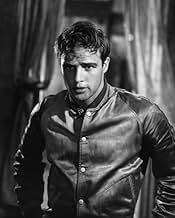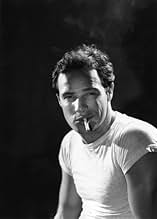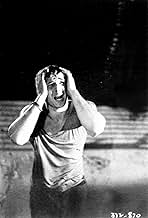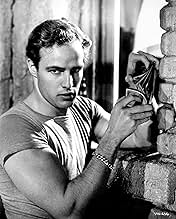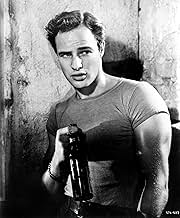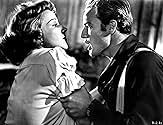Die verwirrte Blanche DuBois zieht in New Orleans bei ihrer Schwester ein und wird von ihrem brutalen Schwager traktiert, während die Realität um sie herum zerfällt.Die verwirrte Blanche DuBois zieht in New Orleans bei ihrer Schwester ein und wird von ihrem brutalen Schwager traktiert, während die Realität um sie herum zerfällt.Die verwirrte Blanche DuBois zieht in New Orleans bei ihrer Schwester ein und wird von ihrem brutalen Schwager traktiert, während die Realität um sie herum zerfällt.
- 4 Oscars gewonnen
- 22 Gewinne & 15 Nominierungen insgesamt
James Adamson
- Extra
- (Nicht genannt)
Irene Allen
- Extra
- (Nicht genannt)
Mel Archer
- Foreman
- (Nicht genannt)
Walter Bacon
- Club Patron
- (Nicht genannt)
Dahn Ben Amotz
- Minor Role
- (Nicht genannt)
Empfohlene Bewertungen
"Streetcar Named Desire" is an exceptional film, thanks to three essential components: (1) the superb acting ability of its two leads, Vivien Leigh and Marlon Brando, as well as that of the supporting cast, small in number but huge in its combined dramatic power, (2) an excellent screenplay by the original playwright, Tennessee Williams, that is packed from beginning to end with explosive, conflict driven dialogue, and (3) the brilliant direction of Elia Kazan who so skillfully brings the play to the screen.
In its legendary opening, Blanche DuBois (Vivien Leigh) emerges from a cloud of locomotive smoke and is helped onto a streetcar by a perfect stranger, a sailor. This simple act neatly ties the film's beginning to Blanche's final, heartbreaking line, "I have always depended upon the kindness of strangers". She, as the central character, is lost in the big city, and she becomes more and more hopelessly adrift in the world as the film approaches its very tragic end.
Broke and friendless, Blanche lands in New Orleans where her sister, Stella (Kim Hunter) lives with her coarse, crude husband, Stanley Kowalski (Brando). Having lost her ancestral home on account of family-related debt and having been dismissed under vague circumstances from her position as a high school English teacher in the small Mississippi town from where she came, she has no other place to go at a time of dire need.
Although Stella is genuinely concerned about Blanche's declining physical and mental state, the shabby apartment where she lives with Stanley consists of two small rooms, barely enough space for the Kowalskis even without Stanley's regular poker group, which seems to park itself there at every available opportunity. What makes matters worse is Stanley's loud and boisterous personality. From the start, Stanley resents the presence of Blanche, which he views as an unwanted, disruptive invasion of his marriage and his home. He regards her with total distrust and disdain. Another reviewer here interpreted this as a cultural clash between the old and the new South, and I think that is a very astute observation. In any case, Stanley is totally unsympathetic to Blanche's plight and looks upon her with nothing but suspicion and contempt.
Blanche is trapped in the claustrophobic and confining prison of the dingy Kowalski apartment. For one, fleeting moment, she believes that Mitch (Karl Malden), Stanley's poker buddy and co-worker, stands as her one bright hope of liberation from the walls that continue to close around her, but he turns out to be anything but her desperately needed "knight in shining armor". Tragically, Mitch, a weak individual who is still dominated by a strong mother well into his adulthood, is the last person with the ability to give Blanche the love and strength that she so urgently needs and to whisk her away from the stifling, debilitating atmosphere of the Kowalski dungeon. Blanche's one, last hope for personal redemption soon fades away forever.
I read that, under different circumstances, the lead roles could have been awarded to Olivia de Haviland and John Garfield. As much as I like them both, this would have been a much different movie with them as the leads. Ms. Leigh, a stunning Englishwoman who managed to score two Oscars for playing two iconic, southern American characters, portrays a mentally declining Blanche with great depth and compassion. As to Mr. Brando's brutish and obnoxious Stanley, you've got to see him in action to appreciate his magnificent performance. As in the case of his Terry Malloy in "On the Waterfront", I don't believe that Stanley's most famous lines from this film would be among the most imitated to this day if they weren't delivered so dynamically by Brando in the first place. "Hey, Stel-la!" Sorry. I just couldn't help myself.
While Brando was beaten out of the Oscar by Humphrey Bogart in "African Queen" (not my favorite Bogey movie by a long shot), Leigh, Malden, and Hunter swept the awards for their performances here and deservedly so. The memorable role of feisty neighbor Eunice also launched Pat Hillias's successful career throughout the golden age of television during the 1950's until her tragic and untimely death in 1960.
If you want to watch an unforgettable rendering of a strong, intense script that is worthy of such a talented cast and director, don't miss this one.
In its legendary opening, Blanche DuBois (Vivien Leigh) emerges from a cloud of locomotive smoke and is helped onto a streetcar by a perfect stranger, a sailor. This simple act neatly ties the film's beginning to Blanche's final, heartbreaking line, "I have always depended upon the kindness of strangers". She, as the central character, is lost in the big city, and she becomes more and more hopelessly adrift in the world as the film approaches its very tragic end.
Broke and friendless, Blanche lands in New Orleans where her sister, Stella (Kim Hunter) lives with her coarse, crude husband, Stanley Kowalski (Brando). Having lost her ancestral home on account of family-related debt and having been dismissed under vague circumstances from her position as a high school English teacher in the small Mississippi town from where she came, she has no other place to go at a time of dire need.
Although Stella is genuinely concerned about Blanche's declining physical and mental state, the shabby apartment where she lives with Stanley consists of two small rooms, barely enough space for the Kowalskis even without Stanley's regular poker group, which seems to park itself there at every available opportunity. What makes matters worse is Stanley's loud and boisterous personality. From the start, Stanley resents the presence of Blanche, which he views as an unwanted, disruptive invasion of his marriage and his home. He regards her with total distrust and disdain. Another reviewer here interpreted this as a cultural clash between the old and the new South, and I think that is a very astute observation. In any case, Stanley is totally unsympathetic to Blanche's plight and looks upon her with nothing but suspicion and contempt.
Blanche is trapped in the claustrophobic and confining prison of the dingy Kowalski apartment. For one, fleeting moment, she believes that Mitch (Karl Malden), Stanley's poker buddy and co-worker, stands as her one bright hope of liberation from the walls that continue to close around her, but he turns out to be anything but her desperately needed "knight in shining armor". Tragically, Mitch, a weak individual who is still dominated by a strong mother well into his adulthood, is the last person with the ability to give Blanche the love and strength that she so urgently needs and to whisk her away from the stifling, debilitating atmosphere of the Kowalski dungeon. Blanche's one, last hope for personal redemption soon fades away forever.
I read that, under different circumstances, the lead roles could have been awarded to Olivia de Haviland and John Garfield. As much as I like them both, this would have been a much different movie with them as the leads. Ms. Leigh, a stunning Englishwoman who managed to score two Oscars for playing two iconic, southern American characters, portrays a mentally declining Blanche with great depth and compassion. As to Mr. Brando's brutish and obnoxious Stanley, you've got to see him in action to appreciate his magnificent performance. As in the case of his Terry Malloy in "On the Waterfront", I don't believe that Stanley's most famous lines from this film would be among the most imitated to this day if they weren't delivered so dynamically by Brando in the first place. "Hey, Stel-la!" Sorry. I just couldn't help myself.
While Brando was beaten out of the Oscar by Humphrey Bogart in "African Queen" (not my favorite Bogey movie by a long shot), Leigh, Malden, and Hunter swept the awards for their performances here and deservedly so. The memorable role of feisty neighbor Eunice also launched Pat Hillias's successful career throughout the golden age of television during the 1950's until her tragic and untimely death in 1960.
If you want to watch an unforgettable rendering of a strong, intense script that is worthy of such a talented cast and director, don't miss this one.
Now that this filmization of "Streetcar" is over a half century old, it can be looked at in a more objective manner than that of the early fifties. The "classical/traditional" acting style of Vivien Leigh, which was placed in stark contrast to the rest of the production personnel, continues to hold its own brilliantly.
It's probably hard today for some to imagine the strong opposition Leigh's casting faced back in 1950, when this prim actress from England was chosen (mostly by studio chief Jack Warner) over "method" Broadway actress Jessica Tandy.
A goodly number of cast and production people from the hit play directed by Elia Kazan were engaged by the director for the film version, and they were not at all enthusiastic about risking a "clash" of acting styles in the leading, pivotal role of Blanche. Kazan himself was reportedly very pro-Tandy, and quite disappointed in the studio's decision.
Yet, Warner and his staff felt Tandy wasn't that well known to the general movie going public--especially in contrast to Leigh, whose marquee name was by then almost magical. In recent interviews, Kazan admitted that working with Vivien was "a real challenge."
In looking at the film today, however, it's Leigh who emerges as a genuine "star" of this production. True, her facial expressions, vocal inflections and body gestures may be the result of careful, deliberate planning, but so what? It's also the aspect that commands attention and draws the viewer to her portion of the screen throughout this film.
Her southern accent, so well learned and retained from her work as Scarlett in "GWTW," is convincing and very beautiful to hear. It also fits Blanche perfectly, as does Leigh's stylized "choreography," which was undoubtedly retained from her long-running London stage performance.
Not all the combined, formidable talents of "method" giants as Karl Malden, Kim Hunter, Marlon Brando or Kazan can diminish the hypnotic work of Leigh here. It may not have excited "Gadge" Kazan, but it remains a highlight performance in film history (and impressed the Academy enough to bestow an "Oscar" to Vivien.)
It also didn't hurt to have Alex North's pungent score, which remains this composer's finest hour.
It's probably hard today for some to imagine the strong opposition Leigh's casting faced back in 1950, when this prim actress from England was chosen (mostly by studio chief Jack Warner) over "method" Broadway actress Jessica Tandy.
A goodly number of cast and production people from the hit play directed by Elia Kazan were engaged by the director for the film version, and they were not at all enthusiastic about risking a "clash" of acting styles in the leading, pivotal role of Blanche. Kazan himself was reportedly very pro-Tandy, and quite disappointed in the studio's decision.
Yet, Warner and his staff felt Tandy wasn't that well known to the general movie going public--especially in contrast to Leigh, whose marquee name was by then almost magical. In recent interviews, Kazan admitted that working with Vivien was "a real challenge."
In looking at the film today, however, it's Leigh who emerges as a genuine "star" of this production. True, her facial expressions, vocal inflections and body gestures may be the result of careful, deliberate planning, but so what? It's also the aspect that commands attention and draws the viewer to her portion of the screen throughout this film.
Her southern accent, so well learned and retained from her work as Scarlett in "GWTW," is convincing and very beautiful to hear. It also fits Blanche perfectly, as does Leigh's stylized "choreography," which was undoubtedly retained from her long-running London stage performance.
Not all the combined, formidable talents of "method" giants as Karl Malden, Kim Hunter, Marlon Brando or Kazan can diminish the hypnotic work of Leigh here. It may not have excited "Gadge" Kazan, but it remains a highlight performance in film history (and impressed the Academy enough to bestow an "Oscar" to Vivien.)
It also didn't hurt to have Alex North's pungent score, which remains this composer's finest hour.
10Rathko
There is little to be said about this movie that thousands of critics have not stated already. It is a magnificent piece of cinema, with an intricate script delivered by actors at the peak of their talents. Leigh is unbearably brittle and fragile and she dances precariously on the edge of sanity. Marlon Brando embodies a sense of brooding masculinity that other men can only dream of attaining, while creating an enduring cinema icon and delivering one of the all-time great movie lines. From the raucous jazz score to the sleazy production design bathed in smoldering grey, 'Streetcar' is a class-act from beginning to end; sexy, brutal, and endlessly fascinating.
Tennessee Williams himself wrote of Vivien Leigh"s performance in "Streetcar Named Desire": "She brought everything I intended to the role and even much more than I had dared dream of".
Brando is wonderful as Stanley Kowalski, but the new viewers to the film seem to come away with the haunting greatness of Vivien Leigh in what is one of the most harrowing and shattering pieces of acting ever committed to film.
Although some have expressed regret that Jessica Tandy did not repeat her stage performance, it is probably good to note that her husband Hume Cronyn and Elia Kazan (the director of the film and play) both never felt that Tandy quite got the character right. If you listen to the radio performance of extracted scenes that Tandy gave on the occasion of the Pulitzer Prize award, it will reenforce the perfection of Leigh's inflections and innate understanding of the role. This inner and complete understanding is what Brando praises Leigh for in his autobiography. He agrees that she plays this Hamlet of female roles better than anyone because he felt she was quite like the character...sadly.
If anyone is interested in great acting check out "Streetcar" for Vivien Leigh's Academy Award winning performance. The supporting cast is outstanding from Kim Hunter and Karl Malden (both Oscar winners for the film)to, of course, the iconographic T-shirt-torn Brando.
Brando is wonderful as Stanley Kowalski, but the new viewers to the film seem to come away with the haunting greatness of Vivien Leigh in what is one of the most harrowing and shattering pieces of acting ever committed to film.
Although some have expressed regret that Jessica Tandy did not repeat her stage performance, it is probably good to note that her husband Hume Cronyn and Elia Kazan (the director of the film and play) both never felt that Tandy quite got the character right. If you listen to the radio performance of extracted scenes that Tandy gave on the occasion of the Pulitzer Prize award, it will reenforce the perfection of Leigh's inflections and innate understanding of the role. This inner and complete understanding is what Brando praises Leigh for in his autobiography. He agrees that she plays this Hamlet of female roles better than anyone because he felt she was quite like the character...sadly.
If anyone is interested in great acting check out "Streetcar" for Vivien Leigh's Academy Award winning performance. The supporting cast is outstanding from Kim Hunter and Karl Malden (both Oscar winners for the film)to, of course, the iconographic T-shirt-torn Brando.
... of two powerhouse juggernauts. Absolutely dripping with tension, acrimony and bitterness as Blanche DuBois and Stanley Kowalski lock horns in their own uniquely individual way with the backdrop a dark, drenched and run down part of New Orleans. Coupled with a pair of superb supporting performances that amplify and escalate the whole to a unique plateau, you'll feel as though you've been run down by an out of control steam train, flattened by a steamroller to be reformed in a furnace fuelled by fear, frustration and desire.
Wusstest du schon
- WissenswertesAs the film progresses, the set of the Kowalski apartment actually gets smaller to heighten the suggestion of Blanche's increasing claustrophobia.
- PatzerWhen Stanley comes back from taking Stella to the hospital, he is looking for a bottle opener. He finds it on the mantelpiece, shakes up a bottle of beer, and opens it. The beer foams up and spills on his trousers. But if you watch at the moment when he swings himself up to sit on the table - before he opens the bottle - you can see that the front of his trousers are already wet. Apparently they re-shot it without him changing into dry trousers.
- Alternative VersionenThe scene in which Blanche and Stanley first meet was edited a bit to take out some of the sexual tension that both had towards each other when the film was first released in 1951. In 1993, this footage was restored in the "Original Director's Version" of the film. The three minutes of newly-added footage sticks out from the rest of the film because Warner Brothers did not bother to restore these extra film elements along with the rest of the movie, leaving them very scratchy due to deterioration.
- VerbindungenEdited into Elia Kazan, vom Outsider zum Oscarpreisträger (2018)
- SoundtracksIt's Only a Paper Moon
(1933) (uncredited)
Music by Harold Arlen
Lyrics by E.Y. Harburg and Billy Rose
Sung by Vivien Leigh while doing her hair
Top-Auswahl
Melde dich zum Bewerten an und greife auf die Watchlist für personalisierte Empfehlungen zu.
Details
- Erscheinungsdatum
- Herkunftsland
- Sprachen
- Auch bekannt als
- Un tranvía llamado Deseo
- Drehorte
- New Orleans, Louisiana, USA(railway station)
- Produktionsfirmen
- Weitere beteiligte Unternehmen bei IMDbPro anzeigen
Box Office
- Budget
- 1.800.000 $ (geschätzt)
- Weltweiter Bruttoertrag
- 55.437 $
- Laufzeit
- 2 Std. 2 Min.(122 min)
- Farbe
- Seitenverhältnis
- 1.37 : 1
Zu dieser Seite beitragen
Bearbeitung vorschlagen oder fehlenden Inhalt hinzufügen







